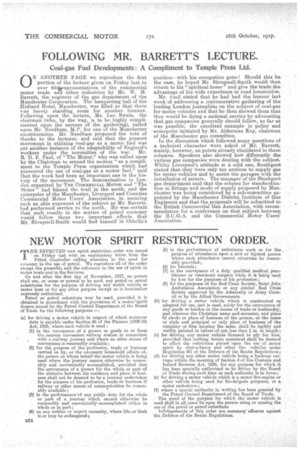FOLLOWING MR. BARRETT'S LECTURE.
Page 18

If you've noticed an error in this article please click here to report it so we can fix it.
Coal-gas Fuel Developments: A Compliment to Temple Press Ltd.
ON ANOTHER PAGE we reproduce the first portion of the lecture given on Friday last to over 50016representatives of the commercial motor trade and other industries by Mr, W. M. Barrett, the ' engineer of the gas department of the Manchester Corporation. The banqueting hall of the Midland Hotel, Manchester, was filled so that there was barely standing roam for another listener. Following upon the lecture, Mr. Leo Swain, the chairman (who, by the way, is to be highly complimented upon the success of the ,gathering), called upon Mr. Needham, M.P. for one of the Manchester constituencies. Mr. Needham proposed the vote of thanks to the lecturer, • and said that the present movement in utilizing coal-gas as a motor fuel was yet another instance of the adaptability of England's workers under the necessities of the war. Mr. R. D. F. Paul, of "The Motor," who was called upon by the Chairman to second the motion "as a compliment to the Temple Press organization which had pioneered the use of coal-gas as a motor fuel," said that the week had been an important one in the history of the movement. The demonstration in London organized by TEE COMMERCIAL Moron. and "The Motor had blazed the trail in the south, and the enterprise of the Manchester, Liverpool and Counties Commercial Motor Users' Association, in securing such an able exponent of the subject as Mr. Barrett, had performed service to the north. He :was certain that such results in the matter of petrol economy would follow these two important– efforts that Mr. Shrapnell-Smith would find himself in Othello's
position—with his occupation gone! Should this be the case he hoped Mr. Shrapnell-Smith would then return to his "spiritual home" and give the trade the advantage of his wide experience in road locomotion.
Mr. .eaul stated that he had had the honour last week of addressing a representative gathering of the leading London journalists on the subject of coal-gas for motor vehicles and that he then showed them that they would be doing a• national service by advocating that gas companies generally should follow, so far as was possible, the excellent example in policy and enterprise initiated by Mr. Alderman Kay, chairman of the Manchester gas committee.
In the discussion which followed many questions of a technical character were asked of Mr. Barrett, mainly, however, on points already elucidated in these columns. Speakers also showed how differently the various gas companies were dealing with the subject. Whilst Liverpool's attitude is a cold one, Southport stated that they were only too anxious to supply gas for motor vehicles and to assist the garages with the installation of meters. The manager of the Stockport gas department said that the scheme for standardization in fittings and mode of supply proposed by Manchester was being considered by a sub-committee appointed by the Manchester District Institute of Gas Engineers and that the proposals will be submitted to the British Commercial Gas Association, with recommendation for a conference on that subject between the B.C.G.A. and the Commercial Motor Users' Association.
























